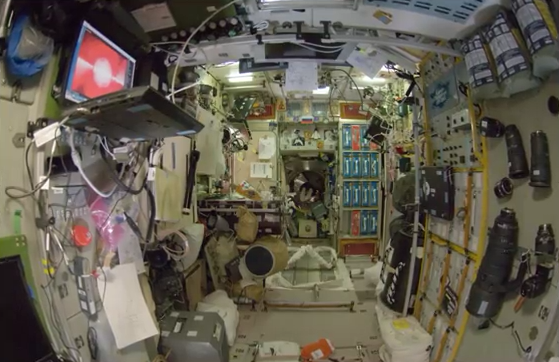(单词翻译:单击)
If you set out to design the perfect method of disease transmission,
如果你打算设计一种完美的疾病传播方法,
you probably couldn't do much better than a spaceship.
飞船是再合适不过的场所了。
You're crammed together in a small space with a bunch of other people.
你和一群人挤在一个小空间里,
Every bit of air breathed out by one person is going to get breathed in by someone else.
一个人呼出的每一点空气都将被另一个人吸入。
As if that wasn't bad enough, actually getting sick in space is way worse than getting sick here on Earth.
这好像还不够糟糕,实际上在太空中生病比在地球上更糟糕。
It's harder for your immune system to fight off the infection, and microbes can actually get stronger in space.
在太空中,你的免疫系统很难抵抗感染,而微生物实际上会变得更强。
So with NASA and companies like SpaceX finally thinking seriously about how to get humans to Mars,
于是,美国宇航局和太空探索技术公司等终于认真思考如何把人类送上火星的问题了,
making sure people don't get sick is pretty high on the list of priorities.
确保人们不生病是他们首要解决的问题之一。
One problem is that weight and power are incredibly limited for anything that gets sent into space.
其中一个问题是,对于被送入太空的任何东西来说,重量和动力都是非常有限的。
That lack of power makes it pretty much impossible to use the kind of high-quality air filters found in places like hospitals.
常见于医院等地方的高质量空气过滤器之类的物件,由于缺乏动力,几乎不可能使用。
There's another kind of filter that's also not available on a spacecraft: the pull of gravity.
还有另一种过滤器也无法在飞船上使用:那就是重力。
Particles in the air generally drift downwards, which is how that layer of dust on the top of your bookshelf keeps reforming.
空气颗粒通常向下落,这就是你书架顶部一层灰尘形成的原因。
It's not just dust, though: imagine what happens when you sneeze in space!
不过,它不仅有灰尘,想象一下你在太空中打喷嚏时会发生什么!
Instead of falling to the ground, everything you sneezed out just floats around waiting to be breathed in again. Gross.
你打喷嚏喷出来的所有东西都会漂浮在周围,等着再次被吸入,而不是落在地上。很恶心。
To make matters worse, places like the International Space Station don't really have separate rooms for different tasks.
更糟糕的是,像国际空间站之类的地方没有为不同任务准备单独的房间。
For example, one section contains the main control computers, a greenhouse,
例如,其中一间包含主控计算机,一个温室,
a treadmill, a stationary bike, two crew quarters, and the main cooking area!
一个跑步机,一个固定的自行车,两个组员宿舍,以及主要的烹饪区。
That's a recipe for a lot of germs exchange…
这些都是细菌交换的温床。
All this is just the setup though, for what happens when those germs get inside the astronauts.
所有这一切都只是前提,看看细菌进入宇航员体内会发生什么。

For reasons researchers are only beginning to understand,
研究人员刚刚才开始了解了这些原因,
simple organisms like bacteria get stronger in space, while complex ones like us get weaker.
简单生物如细菌等在太空变得更强,而复杂生物如人类则会变弱。
After just days in orbit, astronauts start losing muscle mass and bone density.
在轨道上待了几天后,宇航员开始流失肌肉量和骨密度。
And, most critically, their immune systems start to weaken.
最危险的是,他们的免疫系统开始变弱。
That means cuts and bruises take longer to heal, and bone marrow doesn't regenerate as easily.
这就意味着割伤和擦伤需要更长的时间才能愈合,而骨髓不能轻易再生。
The terrifyingly named natural killer cells that help fight off infections, well, they kill less.
一种有着可怕名字——自然杀手的细胞可以帮助人类抵抗感染,但在太空,它们杀死的更少了。
These symptoms aren't unique to space travel.
这些症状并不是太空旅行独有的。
Submarine crews and antarctic explorers can end up with weakened immune systems, too.
潜艇工作人员和南极探险者的免疫系统也可能最终被削弱。
It's what's trying to kill you that makes space so much scarier.
只是试图杀死你的东西使得太空旅行更可怕些。
While the humans are suffering, microbes seem downright thrilled to be up there.
当人类在那里受苦时,微生物似乎很兴奋。
Bacteria cultivated on the ISS, for example, grow thicker cell walls than their siblings back on Earth.
在国际空间站上培养的细菌,比地球上兄弟姐妹的细胞壁更厚。
Which makes things like antibacterial soap less effective at killing them.
这使得抗菌肥皂之类的东西效用减弱。
And not only do individual cells get stronger, the large-scale communities they create do, too!
而且它们不仅仅是个体细胞变强,它们创造的大规模群体也会变得更强!
Some kinds of microbes build slimy, 3D structures called biofilms.
有些种类的微生物会制造出黏黏的三维结构的生物膜。
Bacteria on the old Russian space station Mir formed biofilms so effectively
俄罗斯和平号旧空间站上的细菌形成的生物膜很有效,
that eventually nearly every available surface was covered in one. Again, gross.
几乎把所有表面都覆盖了。再说一次,很恶心。
Things like bacteria tend to get stronger in space because of the weightlessness.
细菌之类的生物在空间站变强的原因是失重。
On Earth, things tend to settle out of a fluid in layers based on their density, which can separate microbes from their food.
在地球上,事物倾向于根据密度在液体里分层,这样可以将微生物从食物中分离出来。
But in microgravity, everything will stay more evenly mixed, which gives microbes easier access to nutrients.
但在微重力条件下,所有物体都均匀混合,这使得细菌更容易接触到营养物。
Everything in space is also exposed to a lot more DNA-altering radiation, which can make simple organisms mutate faster.
太空中的一切更多暴露在可改变基因的辐射中,这使得简单生物变异得更快。
In one study carried out on Mir, after just forty days in orbit, bacteria more than doubled their mutation rate.
一项在和平号空间站实施的研究表明,在轨道上待了仅40天后,细菌的突变率就增加了一倍多。
That leads to a lot more variety for our immune systems to deal with.
这就导致我们的免疫系统要应对更多的细菌种类。
NASA and the other space agencies take these threats seriously.
美国国家航空航天局和其他航天机构都认真地对待这些威胁。
Astronauts are quarantined before they leave Earth,
宇航员在离开地球前被隔离,
and almost everything they touch is sterilized before being sent to orbit.
他们接触的几乎所有的东西在被送入轨道之前都被消毒。
The crews themselves are also composed of some of the healthiest human beings in the prime of their lives.
组员本身也由处在黄金时期,身体素质最好的人组成。
Despite that, in a study of more than a hundred Space Shuttle flights,
尽管如此,在一项对一百多架航天飞机飞行的研究中,
researchers identified 29 cases of infectious disease transmission between members of the crew.
研究人员确认了29例在组员之间传播的传染性疾病。
For missions lasting no more than about a week, this wasn't that big of a deal.
对于不超过一周时间的任务来说,这并不是什么大事。
And astronauts on the ISS always have capsules available to get them home if there's an emergency.
如果有紧急情况,国际空间站的宇航员也可以用太空舱把他们送回家。
But imagine finding out one week into a year-long mission that you've got a serious infection and no chance to return to Earth.
但想象一下,任务从一星期变成了一年,你得了严重的感染疾病却没有机会返回地球会怎样。
Once we figure out how to deal with that, we'll be ready for our first long-term trip out into the Solar System.
我们一旦弄清楚该如何处理这些问题,就做好了进行第一次长期的太阳系之旅的准备。
Thanks for watching this episode of SciShow Space,
感谢您收看本期的太空科学秀。
and thanks especially to our patrons on Patreon who help make this show possible.
特别感谢“Patreon”上的赞助人对本节目的大力支持。
If you want to help us keep making episodes like this,
如果你想帮我们继续制作这样的节目,
you can go to patreon.com/scishow to learn more.
你可以去patreon.com/scishow了解更多信息。
And don't forget to go to youtube.com/scishowspace and subscribe!
也别忘了去youtube.com/scishowspace订阅哦!


